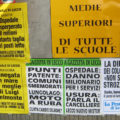I began Ivaldi during my undergraduate years at the University of Texas at Austin. Douglass Parker, a professor of Classics, taught a course in Parageography – the geography of fantasy worlds. The reading list ranged from The Odyssey to Tolkein, and I remember vividly the day Dr. Parker came bounding into class, waving a book and exclaiming, “You all have to read this!” It was Umberto Eco’s The Name of the Rose, just published; that was my first exposure to Italian literature.
The major project for the semester was to develop your own fantasy world, and document it – in some form other than narrative fiction. Some students drew maps and charts and plans; I wrote a guide to the city of Ivaldi.
Throughout the course, Dr. Parker also shared with us snippets (mostly in the form of poetry) from his own created world and the adventures therein of his alter ego, Dionysius Simplicissimus Periphrastes. His documentation was rich and fun, but sometimes short on detail. So in the final exam, which consisted of questions on the world DSP found himself in, we were expected to simply make up whatever we could not have deduced from the documentation. I don’t remember exactly what I said about DSP, but it must have been scurrilous, because I do remember Dr. Parker’s notes on the returned exam: “Lies! Slander, all of it!” But he gave me an A anyhow. <grin>
I’ve been working on this novel in fits and starts ever since, and it’s still not quite finished – maybe about 15% remains to write, and I’ll do yet another revision as I start posting it here (again; it’s been available off and on for years, depending on web server space). To get started, go to the table of contents.
Doug Parker probably figured out long ago that one of the characters is him.
NYT article on the Parageography class
Also: how my hero got his name










